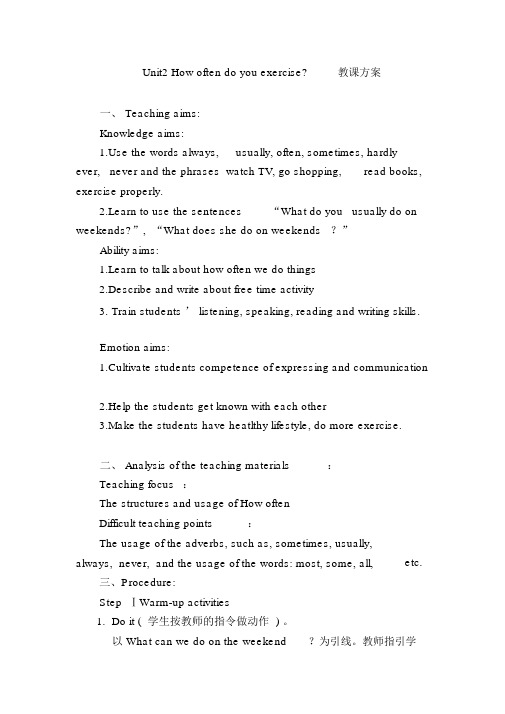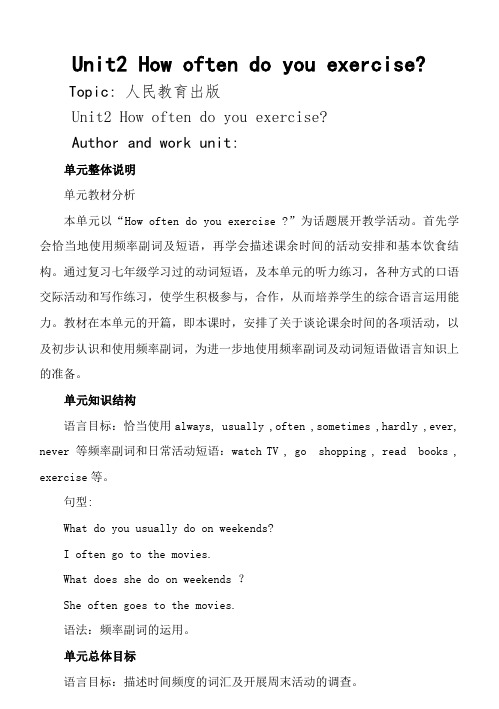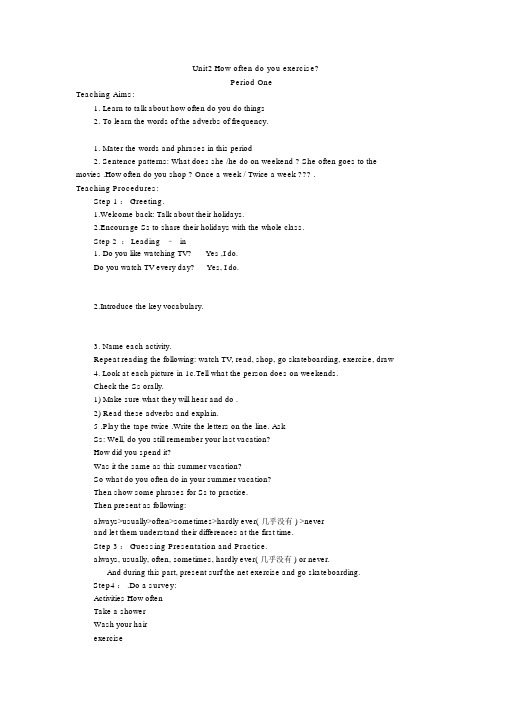人教版八年级上册英语教案Unit2:How-often-do-you-exercise
人教版英语八年级上册Unit2:How-often-do-you-exercise教学设计及案例分析

Unit2 How often do you exercise?教课方案一、 Teaching aims:Knowledge aims:e the words always, usually, often, sometimes, hardly ever, never and the phrases watch TV, go shopping, read books, exercise properly.2.Learn to use the sentences“What do you usually do on weekends?”,“What does she do on weekends?”Ability aims:1.Learn to talk about how often we do things2.Describe and write about free time activity3. Train students ’ listening, speaking, reading and writing skills.Emotion aims:1.Cultivate students competence of expressing and communication2.Help the students get known with each other3.Make the students have heatlthy lifestyle, do more exercise.二、 Analysis of the teaching materials:Teaching focus:The structures and usage of How oftenDifficult teaching points:The usage of the adverbs, such as, sometimes, usually,etc. always, never, and the usage of the words: most, some, all,三、Procedure:Step ⅠWarm-up activities1.Do it ( 学生按教师的指令做动作 ) 。
人教版英语八年级上册Unit2Howoftendoyouexercise大单元优秀教学案例

2.问题导向的探究式学习
本案例以问题导向为核心,引导学生主动探究、思考。通过设计一系列具有挑战性和趣味性的问题,激发学生的好奇心,培养他们的思维能力。在这种探究式学习过程中,学生不仅掌握了英语知识,还学会了如何用英语进行思考和表达,提高了他们的英语素养。
(二)问题导向
问题导向是本章节教学的重要策略。我将围绕单元主题,设计一系列有趣且具有挑战性的问题,引导学生进行思考、讨论和探究。例如:“How often do you exercise? Why is it importantto exercise regularly? What are the benefits of exercising?”等问题,激发学生的好奇心,培养他们主动探究问题的能力。
(三)学生小组讨论
在学生小组讨论环节,我会将学生分成若干小组,每组根据教师提供的问题或任务进行讨论。例如,我可能会给出以下问题:“What sports do you like to play? How often do you exercise? Can you talk about the benefits of exercising?”等。学生可以结合自己的实际经历和观察,用英语进行讨论。在此过程中,我会在各组之间巡回指导,关注学生的语言运用,并及时提供帮助。
在评价过程中,关注学生的全面发展,不仅关注他们的英语知识掌握程度,还要关注其情感态度、合作精神、创新意识等方面。通过鼓励性、指导性的评价,帮助学生建立自信,激发他们进一步学习英语的积极性。
2023年秋人教版英语八年级上册Unit 2 How often do you exercise教案

Unit 2 How often do you exercise?Section A (2d-3c) 教案一、教学内容1.重点单词:maybe,least2.重点短语:at least3.重点句式:—How often does he play soccer?—He plays at least twice a week.—How often do you go to the movies?—I go to the movies maybe once a month.二、教学目标1.知识目标:(1)复习运用频率词汇及询问活动频率。
(2)一般现在时态的熟练运用。
2.能力目标:询问课余活动的问句(What do you usually do on weekends?)和使用频率副词表达的答语。
3.情感目标:通过本单元的学习,培养学生的逻辑表述能力,激发学生的积极思维,并使学生互相了解,增进友谊,加强人际交往,以形成良好的人际关系。
三、重难点1.频率副词的用法2.How often引导的询问做事频率的特殊疑问句及答语3.一般现在时态四、教学准备课件,多媒体五、教学过程Step 1Lead-inHow often do you watch TV?I watch TV every day.How often do you exercise?I exercise twice a week.How often does he exercise?She exercises twice a week.Now please practice the conversations like this with your partner.Step 2Presentation1.完成教材2d的任务1)学生自读对话,回答下面的问题:1.Is Claire free next week?No, she isn’t.2.How often does Claire have dance lessons?Once a week.3.How often does Claire have piano lessons?Twice a week.4.What does Claire do on Tuesday?She plays tennis.5.Does Jack want to join them?Yes, she does.2)大声朗读2d对话,读熟后与小组成员结对分角色表演对话。
人教版八年级上册英语教案Unit2:How-often-do-you-exercise

Unit2 How often do you exercise?Topic: 人民教育出版Unit2 How often do you exercise?Author and work unit:单元整体说明单元教材分析本单元以“How often do you exercise ?”为话题展开教学活动。
首先学会恰当地使用频率副词及短语,再学会描述课余时间的活动安排和基本饮食结构。
通过复习七年级学习过的动词短语,及本单元的听力练习,各种方式的口语交际活动和写作练习,使学生积极参与,合作,从而培养学生的综合语言运用能力。
教材在本单元的开篇,即本课时,安排了关于谈论课余时间的各项活动,以及初步认识和使用频率副词,为进一步地使用频率副词及动词短语做语言知识上的准备。
单元知识结构语言目标:恰当使用always, usually ,often ,sometimes ,hardly ,ever, never 等频率副词和日常活动短语:watch TV , go shopping , read books , exercise等。
句型:What do you usually do on weekends?I often go to the movies.What does she do on weekends ?She often goes to the movies.语法:频率副词的运用。
单元总体目标语言目标:描述时间频度的词汇及开展周末活动的调查。
能力目标:听:能听懂谈论生活习惯、学习习惯和饮食习惯的对话材料。
说:能谈论生活习惯、学习习惯和饮食习惯。
读:能读懂介绍个人生活习惯的文章。
写:能写出section A和section B中的重点单词和重点句型,并能够描述自己的生活习惯。
情感目标:通过开展周末活动调查问卷,引导学生正确处理好学习和娱乐之间的关系。
跨学科学习:通过谈论谁的饮食习惯更健康,引导学生了解什么样的饮食习惯,才能保持健康的体质。
人教版英语八年级上册unit2:How-often-do-you-exercise教案

Unit2 How often do you exercise?Period OneTeaching Aims:1.Learn to talk about how often do you do things2.To learn the words of the adverbs of frequency.1.Mater the words and phrases in this period2.Sentence patterns: What does she /he do on weekend ? She often goes to the movies .How often do you shop ? Once a week / Twice a week ??? .Teaching Procedures:Step 1 : Greeting.1.Welcome back: Talk about their holidays.2.Encourage Ss to share their holidays with the whole class.Step 2: Leading–in1. Do you like watching TV?Yes ,I do.Do you watch TV every day?Yes, I do.2.Introduce the key vocabulary.3. Name each activity.Repeat reading the following: watch TV, read, shop, go skateboarding, exercise, draw4.Look at each picture in 1c.Tell what the person does on weekends.Check the Ss orally.1) Make sure what they will hear and do .2) Read these adverbs and explain.5.Play the tape twice .Write the letters on the line. AskSs: Well, do you still remember your last vacation?How did you spend it?Was it the same as this summer vacation?So what do you often do in your summer vacation?Then show some phrases for Ss to practice.Then present as following:always>usually>often>sometimes>hardly ever( 几乎没有 ) >neverand let them understand their differences at the first time.Step 3 : Guessing Presentation and Practice.always, usually, often, sometimes, hardly ever( 几乎没有 ) or never.And during this part, present surf the net exercise and go skateboarding.Step4 : .Do a survey:Activities How oftenTake a showerWash your hairexerciseClean your roomAsk and answer: How often do you take a shower?How often does he take a shower?Let Ss ask and answer in pairs, using always, usually, often, sometimes, hardly ever(几乎没有) or never.Step 5: HomeworkPeriod Two ( Section A2a-2b)Teaching Aims:1.Students can learn to talk about activities and how often to each other2.Students can listen, talk, read and write these words correctlyTeaching Difficulties:1.Words: once, twice, internet, program, full, swing2.Phrases: swing dance3.Sentence patterns: How often do you shop? I shop once a month.How often does Cheng watch TV? He watches TV ..Teaching Aids:Tape recorder; Multi-Media.Teaching Procedures:Step 1 : Greeting.Step 2 : RevisionWhat do you usually do on weekends?What does he usually do on weekends?What do they usually do on weekends?Step 3 : PresentationShow a calendar to students .T:What ’ s this ? Can you name it ?Ss : It ’ s a calendar .T : Very good . Look , this is the weekend . Saturday and Sunday are the weekends .What do you do on weekends ? First have students discuss and answer the question like this .A : What do you do on weekends ?B : I often play football.Then direct out“ how often⋯?”A : What do you usually watch TV on weekends ?B : I usually watch TV on weekends .A : How often do you watch TV ?B : I watch TV once a week/three times a month/every day( 告学生是表率的)⋯(The teacher must help students answer the question.因能够加学生言的感知,用个法频频两三句子,学生自然就会种言的表达了)Step 4 Listening and writingFirst have students listen listen to the tape once .At the same time , tell students the conversation about Cheng is talking how often he does different avtivities .First number the activities they hear (1-5) . Then have students listen again andtyr to match his activities with the number of times he does them .Step 5 PairworkHave students talk about what they do on weekends and How often do they do something each other ?Eg :A : What do you do sth on weekends ?B : I often do sth .A : How often do you do sth ?B : I do sth every .Then have some pairs to act out their conversations.Step5 Practise in writing .First help students finish“ question for underlined part”Eg: He goes to the movies three times a month .How often does he go to the movies ?Then have students finish the following evercises .1 . I often go to the movies . ( 划部分提)2 .他每周看一次。
人教版八年级上册Unit2How often do you exercise-全单元教学设计

人教版八年级上册Unit2How often do you exercise?全单元教学设计人教新目标英语八年级上册Unit 2 How often do you exerciseI. Teaching article: Unit TwoII. Teaching aims and demands:What do you usually do on weekendsI sometimes go to the beach.How often do you eat vegetablesEvery day.Most of the students do homework every day.III. Teaching important and difficult points:Talk about how often you do things.IV. Teaching ways:Revision, Learning, Practice and Reading.V. Teaching tools:Tape-recorderV. Teaching time:Six periodsVI. Teaching procedure:The 1st periodStep 1 Greet the classT: I’ll introduce myself first. I’ll be your English teacher this term. Do you like English I hope we’ll get along very well. I’m not only your teacher, but can be your friends. We’ll be happy together. Now let’s begin. This class we’ll learn Unit2. How often do you exercise Please open your books at page9.Step 2 Section A 1aFirst look at the picture. Ask a few students to say what they see in the thought bubbles. Each thought bubble shows something a person does on weekends.Then name each activity. Ask students to repeat each one.One girl is shopping.Another girl is reading.This boy is watching TV.The girl is helping with housework.Point out the sample answer. Then ask students to list all the activities in the thought bubbles. If they don’t know how to write the activities, use bilingual dictionaries.Then ask the students who finishes first to write the answers on the board.Check the answers on the board and ask students to correct their ownactivities.Step 3Display a large calendar that shows the days of the week. Tell students Saturday and Sunday are the weekend. Ask students to repeat Weekend. Then show these new words.How often always usually often sometimes hardly ever never Step 4 1c PairworkFirst ask two students to read the sample in speech bubbles.What do you usually do on weekendsI often go to the movies.Now work with a partner. Make your own conversations about the people in the picture. For example.Step 5 SummaryThis class we’ve learnt some names of activities: watching TV, reading, skateboarding, exercising, shopping. And we’ve also leant some adverbs of frequency: always, usually, often, sometimes, hardly, ever, never. Step 6 Homework:Keep a weekend dairy showing what you do on weekend. You can write down you do from the time you get up until you go to sleep.The 2nd periodStep 1 Greet the class.Step 2 Learn some new wordsStep 3 2aNow please look at the list of activities and read after me.Watch TV Exercise ---ReadStep 4 2bNow please look at the heading. How often In the chart in Activity 2a. Ever day Once a week Twice a week Three times a weekOnce a month Twice a monthStep 5 2c PairworkFirst ask a student to read the list of activities to the class.Watch TV Surf the Internet Read English books Go to the movies ExerciseNow tell me how often do these activities. You can write your answers under the list of How often.Step 6 2dRole play the conversation and underline any difficult point.Lead Ss to read the conversation and explain some difficult ter,make their own conversations in pairs like the sample one.Step 7 Grammar FocusStep 8 Summary and HomeworkThis class we’ve leant some adverbs of frequency: every day, once a week, once a month, twice a month. And we’ve leant to talk about howoften people do things. And also we’ve had a game.The 3rd periodStep 1 Greet the class and check the homework.Step 2 Show the new words on the screen and teach students how to read. And ask them to repeat.Step 3Now please open your books at page11. Look at 3a first. I’ll read each line to plete the questions with ‘do and does’.Then match the questions and st write questions with the words given, and ask and answer them with a partner.Finish 3b.Correct any mistakes.Step 4 3c Group workWhat can you do improve your EnglishCollect the answers on the blackboard. For exampleRead English books Sing English songs See English moviesHow often do you do the thingsStep 5 An activityAsk students to talk about how often their family members do things. For example,My mother cooks dinner every day. We eat in a restaurant once a week.My father goes to the United States once a year.Step 6 SummaryThis class we’ve read a magazine article and done an exercise. I hope you can study hard and be good students. Your parents and teachers are proud of you.Step 7 HomeworkWrite a passage on how to improve your English.The 4th periodStep 1 Greet the class and check the homework.Step 2 Show the new words on the screen and teach the new words. Ask students to repeat them. And make sure everyone knows the meanings. Step 3 Section B 1aNow open your books at page12. Look at Activity 1a. First I’ll read each word. Junk food Milk Fruit Vegetables Sleep CoffeeThere are vegetables on the plate.Step 4 1b PairworkAsk some pairs to present some questions and answers to the class. Step 5 1cNow you’ll hear a reporter interview two people. Tina and Bill.Play the recording the first time. Students only listen. Then play it again. This time ask students to circle Yes, No or I don’t know.Step 6 1dFirst read the questions in the chart to the class.How often do you exercise How often do you eat vegetablesHow often do you eat fruit How many hours do you sleep every nightHow often do you drink milk How often do you eat junk food Listen and fill in the blanks.Check the answers.Step 7 1e PairworkRead the sample in speech bubbles to the class first.Interviewer: How often do you exerciseTina: I exercise every day.Interviewer: And How often do you …Step 8 Summary and HomeworkThis class we’ve leant some words and leant to interview somebody with the sentence, how often… After class please give more practice.The 5th periodStep 1 Greet the class and check the homework.Step 2 Show the new words on the screen and teach them. Read the new words to students and ask them to repeat.Step 3 2aOpen your books at page 13. Look at Activity 2a.Read the instruction to the class.Explain the phrases and rank these activities.Check the answers.Step 4 2b This activity provides reading practiceusing the target language.Read the article and complete the pie charts.Ask students to work individually.Explain some language points and correct mistakes if any.Step 5 2cAsk students to have a quick look at the questions in 2c,then read the passage again and answer the questions.Correct mistakes if any. Then ask some students to read their answers to the class.Step 6 2dAsk Ss to read through the instruction,then do it individually.Check the answers and lead Ss to read the sentences,call attention to the pronunciation and tone.Step 7 2eFree talk Work in groups of five to ask each other how often they do free time activities.Fill the results in the chart and make a pie chart.Check the answers together.Step 8 Summary and HomeworkThis class we’ve learnt a lot. We know what healthy things are and unhealthy things are.Recite activity 2b.The 6th periodStep 1 Greet the class and check the homework.Step 2 Show the new words on the screen and teach them. Read the new words to students and ask them to repeat.Step 3 3aOpen your books at page 15. Look at Activities 3a. Look at the information in the chart and talk about whether they have these good /bad habits or plete the report and check the answers.Read the report and explain some language points.Step 4 3bComplete the chart with your own information.Ask students to work individually and talk about his or her ter, present their work,lead Ss to have a good habit.Step 5 3cAsk students to finish the writing individually. Then ask some students to read their paragraphs to the class.Lead Ss to tell good habits from bad habits.Step 6 4 SurveyTake the health quiz.Who is the healthiestQuestions.1. How often do you exercise2. What sports do you play3. How often do you eat vegetables ---Collect the results,choose the healthiest one.Step 7 Self Check 1and 2Complete the chart and make five sentences. Check the answers.Step 8 Self Check 3(for homework)Complete the conversation,check the answers.Then role play the conversation.Often every day usually three times a week sometimesonce a week always once a month hardly ever neverStep 9 SummaryThis class we’ve reviewed vocabulary and abverbs of requency in unit 2. And we’ve reviewed the target language in this unit and done some exercises.Step 6 HomeworkIf time doesn’t permit, leave some exercises of workbook as homework.。
人教版八年级上册英语教案 Unit 2 How often do you do

3.Main task:How to write a composition of one’s habits.
【教学难点】:Enable the students tolearn to write one’s own habits.
C. too much, too much D. too much, much too
Step 7. Homework:
How healthy are you? Write a passage about your own eating habit.
【板书设计】Unit2How often do you exercise?
How often…?
KatrinaBill
1. every dayhardly ever
2. 10 or 11 timestwice a week
3. every daynever
4. ninenine
5. every daynever
6. 2 or 3 times a week3 or 4 times a week
Step 3. Fill in the blanks (3b)
T: We know Bill is kind of unhealthy. And he also writes a letter .Let’s fillin the blanks in Bill’s letter.
(After Ss have finished, check it)
课题:Unit2How often do you do exercise?
人教新目标八年级英语上册教案Unit2Howoftendoyo

福建省高级人民法院印发《福建法院在线调解工作规范》的通知文章属性•【制定机关】福建省高级人民法院•【公布日期】2020.10.09•【字号】闽高法〔2020〕78号•【施行日期】2020.10.09•【效力等级】地方司法文件•【时效性】现行有效•【主题分类】调解正文福建省高级人民法院印发《福建法院在线调解工作规范》的通知闽高法〔2020〕78号全省各级人民法院、厦门海事法院、平潭综合实验区人民法院、福州铁路运输法院,本院各部门:现将《福建法院在线调解工作规范》印发给你们,请结合实际认真贯彻执行。
执行中遇到的问题,请及时报告我院。
福建省高级人民法院2020年10月9日福建法院在线调解工作规范为进一步完善一站式多元解纷机制,规范在线调解工作,根据最高人民法院《关于人民法院进一步深化多元化纠纷解决机制改革的意见》《关于人民法院特邀调解的规定》《关于人民法院深化“分调裁审”机制改革的意见》《关于建设一站式多元解纷机制一站式诉讼服务中心的意见》等规定,结合我省法院在线调解工作实际,制定本规范。
一、总则第一条 [在线调解]在线调解是指与人民法院建立诉调对接关系的特邀调解组织、特邀调解员、法院专职调解员,通过在线调解平台开展的调解,是一种高效、便捷、实时的现代化矛盾纠纷解决方式。
第二条 [在线调解平台]本规范所称的“在线调解平台”,是指人民法院建设或认可的各类依托信息技术实现调解资源整合,具备远程音视频调解及录音录像、在线委派、委托调解、在线生成调解协议、在线申请司法确认等功能的网站、系统及其他信息化载体。
第三条 [平台对接]推动在线调解平台与其他部门、行业调解平台对接,实现信息互联互通、矛盾纠纷网上处理。
第四条 [基本原则]在线调解应当遵循下列原则:(一)自愿平等。
尊重当事人意志,平等对待当事人;(二)便捷高效。
提升诉讼服务,方便纠纷解决;(三)诚实信用。
如实陈述矛盾纠纷,不得进行虚假调解;(四)合法依规。
- 1、下载文档前请自行甄别文档内容的完整性,平台不提供额外的编辑、内容补充、找答案等附加服务。
- 2、"仅部分预览"的文档,不可在线预览部分如存在完整性等问题,可反馈申请退款(可完整预览的文档不适用该条件!)。
- 3、如文档侵犯您的权益,请联系客服反馈,我们会尽快为您处理(人工客服工作时间:9:00-18:30)。
Unit2 How often do you exercise?
Topic: 人民教育出版
Unit2 How often do you exercise?
Author and work unit:
单元整体说明
单元教材分析
本单元以“How often do you exercise ?”为话题展开教学活动。
首先学会恰当地使用频率副词及短语,再学会描述课余时间的活动安排和基本饮食结构。
通过复习七年级学习过的动词短语,及本单元的听力练习,各种方式的口语交际活动和写作练习,使学生积极参与,合作,从而培养学生的综合语言运用能力。
教材在本单元的开篇,即本课时,安排了关于谈论课余时间的各项活动,以及初步认识和使用频率副词,为进一步地使用频率副词及动词短语做语言知识上的准备。
单元知识结构
语言目标:恰当使用always, usually ,often ,sometimes ,hardly ,ever, never 等频率副词和日常活动短语:watch TV , go shopping , read books , exercise等。
句型:
What do you usually do on weekends?
I often go to the movies.
What does she do on weekends ?
She often goes to the movies.
语法:频率副词的运用。
单元总体目标
语言目标:描述时间频度的词汇及开展周末活动的调查。
能力目标:
听:能听懂谈论生活习惯、学习习惯和饮食习惯的对话材料。
说:能谈论生活习惯、学习习惯和饮食习惯。
读:能读懂介绍个人生活习惯的文章。
写:能写出section A和section B中的重点单词和重点句型,并能够描述自己的生活习惯。
情感目标:通过开展周末活动调查问卷,引导学生正确处理好学习和娱乐之间的关系。
跨学科学习:通过谈论谁的饮食习惯更健康,引导学生了解什么样的饮食习惯,才能保持健康的体质。
单元教学重难点一览
单元学情分析
1、学生已有的认知水平和能力基础
八年级的学生大多数基础较好,在教学中尤其要注意学习能力的培养;需要多教给学生学习的方法并将课文重点处理到位。
学生的共同之处如下:大家都是接触教材已一年多了,所以已经过了磨合期,学生对新老师,新教材都有一种新鲜感,也有初生牛犊不怕虎的冲劲,想利用学过的英语知识,说出流利而准确的英语。
在这样的基础上,学生对于讨论跟他们生活息息相关的相关内容一概很容易产生兴趣。
2、学生学习本课可能遇到的困难和问题
他们之间也存在着差异:有些学生基础不错,愿意积极分享自己的意见,但有些学生原来小学初一时接受的英语教育基础比较差,有说的冲动,却无说的行动,怕丢面子,怕被嘲笑。
这样就给听说训练课的开展设置了一道难关。
我在设置教学目标时充分考虑到这些实际情况,根据不同的学生情况,设置不同难度阶梯,让每个学生都有机会达到成功点,都有属于自己的英语话语权。
3、学生在学习过程中可能采取的各种学习策略
教师创设提供的情景,降低了学生学习对话 ,交际用语的难度,学生在欣赏影视短片和交际情景中感受使用英语的魅力,并积极主动地掌握必要的有关交通的习惯词汇与语句,学生充分在情景中,通过自身的交际活动,学习英语。
口头的表达最终的体现还应该是书面的应用,还需有写作内容的量带质的提升,学生可以及时做书面练习和造句。
单元教学建议
首先进行集中识字,为本单元的学习作好铺垫。
其次,充分利用听力材料和阅读材料,训练和提高学生的听力和阅读水平。
在听读的基础上创设语言情景,加强读写训练。
培养学生的听、说、读、写综合能力。
单元课时分配
课型:两节新授课
时间:每节40分钟
教学要求:speaking、listening and writing.
教学内容
Section A
教学目标
知识与能力
1.Match the vocabulary:
delicious,awful expensive,inexpensive,crowded
2.Master and use:Where did Vera go on vacation?
Did Vera like the vacation?
How were the stores?They were very expensive.
过程与方法
大面积操练,采用学生提出间题,学生解决问题,借助媒体来提高学生的主动性。
情感态度价值观
培养学生的逻辑表述能力,激发学生的积极思维,并使学生互相了解,增进友谊,加强人际交往,以形成良好的人际关系。
教学重、难点及教学突破
重点
l.The vocabulary:flew kite, later ,felt ,little ,comer ,till ,fry, question ,discuss ,difficulty
nguage:Where did Vera go on vacation?
Did Vera like the vacation?
How were the stores?They were very expensive.
难点
培养学生的听、说、读、写综合能力
教学突破
对于本课的单词短语和语法点的学习。
Language:How often...?及答语的学习.
教学准备
录音机、磁带、课件
学生准备
预习生词和课文。
课型:两节新授课
时间:每节40分钟
教学要求:speaking、listening and writing. 教学步骤
板书设计
Unit 2
1.delicious,awful,expensive,inexpensive
2.Where did Vela go on vacation?
How were the stores?
本课小结
Section B
教学内容
Section B
教学目标
知识与能力
1.New words and expressions:flew kite, later ,felt, little, corner ,discuss ,difficulty
过程与方法
通过例子The ring is one hundred million dollars.It’s expensive.引人本课,设置会话情景来激发学生兴趣,调动其学习主动性。
利用多媒体图片大量练习句型,提出问题,解决问题,体现师生互动。
通过复习一般过去时引出本课的重点------日记。
学会日记的写法。
情感态度价值观
教育学生热爱生活,积极参与班级集体活动。
教学重、难点及教学突破
重点
1.The vocabulary:delicious,awful,expensive,inexpensive,crowded
nguage:Where did you/they/he/she go on vacation?
I/They/He/She went to Japan.
How were the museums/people/stores?
They were crowded expensive/friendly.
难点
日记的格式。
Use the language to talk about past events.
教学突破
对于本课的单词短语通过卡片或图画来引出学习。
Language:通过询问过去的事情引出日记。
教学准备
教师准备
录音机、磁带、课件
学生准备
预习生词和课文。
教学步骤
课型:两节新授课
时间:每节40分钟
教学要求:speaking、listening and writing.
教学步骤
板书设计
Unit 2 1.delicious,awful,expensive,inexpensive 2.Where ...?
How ...?。
